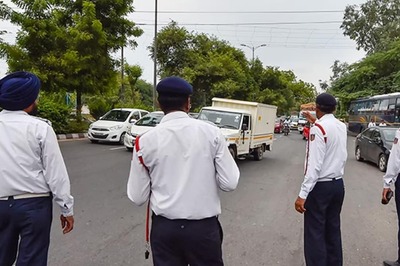
views
Tripoli: Libyan rebels claimed to be in control of most of Tripoli on Monday after their swift advance on the capital heralded the fall of Muammar Gaddafi's 42-year regime. But they still faced some fierce resistance, with scattered gunbattles erupting, and the mercurial leader was nowhere to be found.
The international community called on Gaddafi to step down and moved ahead with post-war planning as euphoric rebel supporters celebrated in Green Square, the symbolic heart of the fading Gaddafi regime. Colleagues warned the leader would not go easily, even after three of his sons were arrested.
"The real moment of victory is when Gaddafi is captured," Mustafa Abdel-Jalil, the head of the rebels' National Transitional Council, told a news conference in the opposition's de facto capital of Benghazi in the east, hundreds of miles from Tripoli.
Rebel spokesman Mohammed Abdel-Rahman, who was in Tripoli, warned of pockets of resistance and said as long as Gaddafi remains on the run the "danger is still there."
President Barack Obama said the situation in Libya remained fluid and uncertain. But he said Gaddafi's regime was coming to an end. After a five month NATO-led bombing campaign, Obama said the situation in Libya reached a tipping point in recent days. However, he said there are elements of the regime that remain a threat.
NATO vowed to keep up its air campaign until all pro-Gaddafi forces surrender or return to their barracks. The alliance's warplanes have hit at least 40 targets in and around Tripoli in the past two days - the highest number on a single geographic location since the bombing started more than five months ago, NATO said.
"We came out today to feel a bit of freedom," Ashraf Halaby, a 30-year-old Tripoli resident, said as he and four of his friends watched several hundred people celebrating at Green Square. "We still don't believe that this is happening."
Revelers flashed the "V" for victory sign and motorists circled the plaza, honking horns and waving rebel flags.
After they took it over late Sunday night, rebels declared that Green Square would now be called Martyr's Square, restoring the name it had before Gaddafi's regime took power more than four decades ago. Google's map of Tripoli has already adopted the rebels' new name for the square. Similarly, the opposition also took up the pre-Gaddafi flag of Libya as their own at the start of their uprising six months ago.
Libyan state television was off the air Monday amid reports that rebels had seized what had been a key lever of regime propaganda.
Rebels erected checkpoints on the western approaches to the city, handing out candy to passengers and inquiring about their destinations. Cars leaving the city were subjected to more rigorous checks.
Most of the city, a metropolis of some 2 million people on the Mediterranean coast, was on edge. Most stores were shuttered and large areas lifeless. There was barely a sign of the thousands of rebels now in the city.
Clashes broke out early in the day at Gaddafi's longtime command center known as Bab al-Aziziya, when a few government tanks emerged from the complex and opened fire at rebels trying to get in, according to residents living nearby. An Associated Press reporter at the nearby Rixos Hotel, where foreign journalists stay, heard gunfire and loud explosions from the direction of the complex.
Moammar al-Warfali, whose family home is next to the Gaddafi compound, said there appeared to be only a few tanks belonging to the remaining Gaddafi forces that have not fled or surrendered.
"When I climb the stairs and look at it from the roof, I see nothing at Bab al-Aziziya," he said. "NATO has demolished it all and nothing remains."
There were also signs of tension between rebels and residents at a gas station in the neighborhood of Gourji, with heated arguments over who should fill up first after rebels cut in line. Opposition leaders urged people to protect public property, and no looting was reported.
The Rixos hotel where foreign journalists are staying also remained under the control of Gaddafi forces, with two trucks loaded with anti-aircraft machine guns and pro-regime fighters and snipers posted behind trees. Rebels and Tripoli residents set up checkpoints elsewhere in the city.
The opposition leader Abdel-Jalil said rebels have now captured three of Gaddafi's sons. He said they detained al-Saadi Gaddafi on Sunday night along with his brother Seif al-Islam, the one-time heir apparent to his father.
Gaddafi had seven biological sons and a daughter who all played roles in their father's regime, some in diplomacy and others in business. Al-Saadi and his brothers Mutassim and Khamis all headed military brigades. One of his sons was killed in the civil war.
The International Criminal Court has confirmed the capture of Seif al-Islam, who along with his father faces charges of crimes against humanity. Another son, Mohammed, was under house arrest.
A rebel field commander claimed reinforcements were arriving in Tripoli by sea from the north, south and southeast.
"Our fighters are coming from all directions and, God willing, today we will liberate the whole city," the commander, Suleiman Sifaw, told the AP.
The startling rebel breakthrough, after a long deadlock in Libya's 6-month-old civil war, was the culmination of a closely coordinated plan by rebels, NATO and anti-Gaddafi residents inside Tripoli, rebel leaders said. Rebel fighters from the west swept over 20 miles (30 kilometers) in a matter of hours Sunday, taking town after town and overwhelming a major military base as residents poured out to cheer them. At the same time, Tripoli residents secretly armed by rebels rose up.
When rebels reached the gates of Tripoli, the special battalion entrusted by Gaddafi with guarding the capital promptly surrendered. The reason: Its commander, whose brother had been executed by Gaddafi years ago, was secretly loyal to the rebellion, a senior rebel official, Fathi al-Baja, told The Associated Press.
The rapid rebel advance into Tripoli in an hours-long blitz showcased the evolution of the opposition fighters. They first rose against the regime six months ago, swiftly capturing the eastern part of the vast, oil-rich North African nation but failing to advance westward toward Tripoli even with the help of months of NATO airstrikes.
For months, the rebels - mainly civilian volunteers who took up arms and had little military training - were judged to be big on zeal but short on organization and discipline. But their stunning success in Tripoli showed a surprisingly high level of planning, coordination and discipline. And even some of the rebels themselves said they were surprised at how easy it was.
The U.S. and other nations have recognized the National Transitional Council as Libya's legitimate government. But the rebels are a disparate group encompassing former government insiders, Western-leaning intellectuals and even a smattering of Islamists, raising concern about whether the factions can unite in a post-Gaddafi Libya.
Abdel-Jalil sought to allay those worries, saying the opposition wanted a nation built on the principles of "freedom, equality and transparency."
In London, British Prime Minister David Cameron said frozen Libyan assets would soon be released to help the country's rebels establish order, saying Gaddafi's regime was "falling apart and in full retreat."
Britain's Defense Secretary Liam Fox said resistance was coming mainly from foreign mercenaries, rather than Libyans still loyal to Gaddafi. "There is a certain amount of violence still occurring, we also know that a lot of the resistance from the pro-Gaddafi forces has in fact come from mercenary elements," he told BBC radio.
"It does appear that a lot of the Libyan forces themselves inside Tripoli either stayed at home or put down their arms - and that may bode well for a diminishing level of violence during the transitional period," he said.
Abdel-Jalil, the rebel chief, vowed to give Gaddafi a "fair trial with all legal guarantees" if captured. But Gaddafi's defiant audio messages raised the possibility of a last-ditch fight over the capital. Gaddafi, who was not shown, called on supporters to march in the streets of the capital and "purify it" of "the rats."
Gaddafi's former right-hand man, who defected last week to Italy, said the longtime leader would not go easily.
"I think it's impossible that he'll surrender," Abdel-Salam Jalloud said in an interview broadcast on Italian RAI state radio, adding that "He doesn't have the courage, like Hitler, to kill himself."
Jalloud, who was Gaddafi's closest aide for decades before falling out with the leader in the 1990s, fled Tripoli on Friday, according to rebels.
The uprising against Gaddafi broke out in mid-February, inspired by successful revolts in Egypt and Tunisia, Libya's neighbors to the east and west respectively. A brutal regime crackdown quickly transformed the protests into an armed rebellion. Rebels seized Libya's east, setting up an internationally recognized transitional government there, and two pockets in the west, the port city of Misrata and the Nafusa mountain range.
Gaddafi clung to the remaining territory, and for months neither side had been able to break the other.
In early August, however, rebels launched an offensive from the Nafusa Mountains, then fought their way down to the Mediterranean coastal plain, backed by NATO airstrikes, and captured the strategic city of Zawiya.



















Comments
0 comment